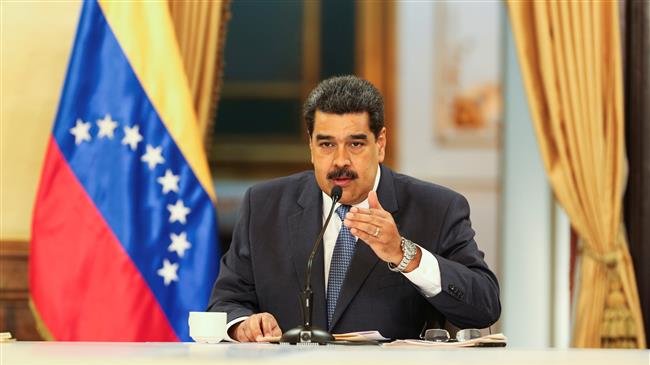Trump ‘persecuting Venezuelans just like Hitler’: Maduro


President Nicolas Maduro says US President Donald Trump is “persecuting” Venezuelans through harsh economic sanctions that have prevented the country from easing its worsening crisis.
Maduo, who once again increased minimum wage by 150 percent on Thursday, blamed Trump for what his people have been through amid an economic crisis which is said to be the worst in the modern history.
He compared Trump to the Nazi dictator Adolf Hitler, saying “just like Hitler persecuted the Jewish people, Donald Trump persecutes the people of Venezuela.”
The latest raise by the Venezuelan president increases the monthly minimum wage from 1,800 to 4,500 bolivars, or about $50 at the official rate.
Maduro called the readjustment the first “correction factor” of the economic plan in force, saying the reforms have allowed a “significant slowdown in inflation,” but admitted it still “remains worrying.”
He said inflation is “well below the expectations of the International Monetary Fund (IMF),” which forecasted that Venezuela hyperinflationary crises will further deepen.
In a report last month, the world body said the inflation rate will reach 10 million percent next year. It estimated that consumer prices in Venezuela would rise 1,370,000 percent in 2018, up from a July projection of 1 million percent.
The Venezuelan president said US economic sanctions blocked his country from the financial markets and kept the government from refinancing billions in debts.
Maduro has accused the US of waging an economic war, which has sparked massive inflation and a shortage of basic commodities such as foodstuffs and medicine, and have forced millions of Venezuelans to leave the country.
Washington has targeted Caracas with harsh economic and political sanctions since 2014 under the pretext of alleged human rights abuses and threats to US national security.
About 2.3 million Venezuelans have left their home country since 2015 — more than 500,000 only this year — mostly for Brazil, Chile, Colombia, Ecuador, and Peru, in search of a better life.
About 90 percent of Venezuelans now live in poverty, while more than 60 percent interviewed in a survey conducted earlier this year admitted to waking up hungry because they lacked the means to buy food.
Maduro has accused the opposition of being part of the US plot to overthrow his government, saying Caracas will remain steadfast. He has also called on Venezuelan migrants to return to work for the future of their homeland.








